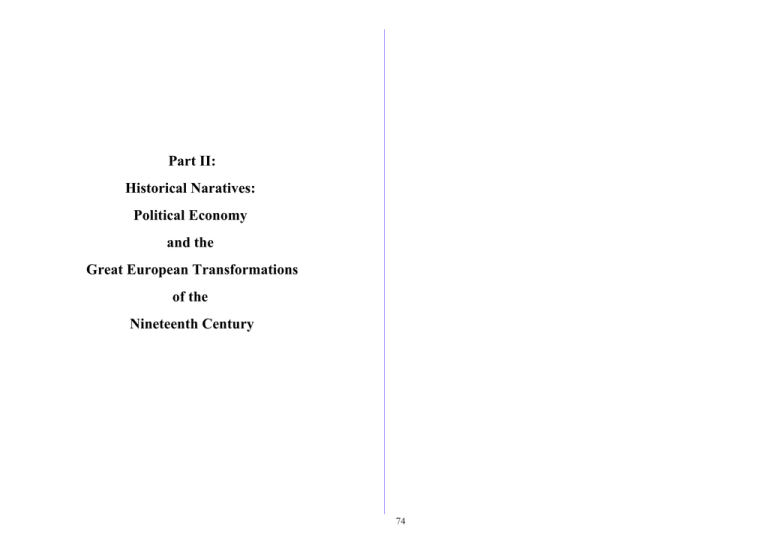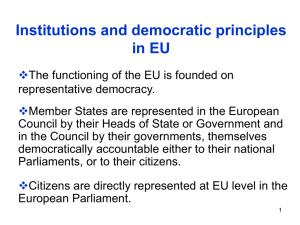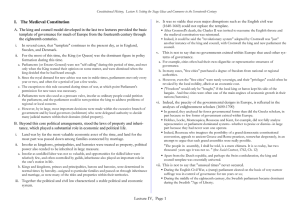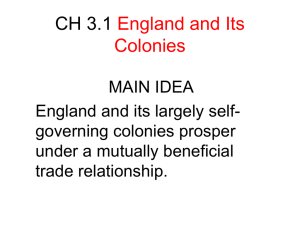Part II: Historical Naratives: Political Economy and the
advertisement

Part II: Historical Naratives: Political Economy and the Great European Transformations of the Nineteenth Century 74 and also if control of some policy areas becomes increasingly important for the crown or the parliament. Democratically selected parliaments may replace elite memberships when visions of the good society change for median members of parliament, or when tax revenues are disrupted by strikers who are willing to curtail such labor boycotts in exchange for suffrage reform. Of course, these analytical results are not unique solutions to some overarching game in which all players know fully the universe in which they play. Rather, a particular institutional arrangement has been shown to solve a variety of problems. Robust institutional designs are, thus, more likely to be selected through time than more specialized solutions that are somewhat more efficient, because such robust solutions tend to survive while specialized solutions disappear from the portfolio of "familiar" solutions as circumstances change. Those with the power to make policies and adopt new institutions will naturally be most familiar with institutional structures that already in use. Thus, one expects that organizational decision and incentive problems will be addressed with minor variations of such institutional templates rather than created whole cloth. If the king and council template is truly robust, and the circumstances in which refinements to it are made are commonplace, then the peaceful institutional identified in the rational choice models should be evident in history. Part II of the book attempts to demonstrate that the implications of the analytical history provide useful insights into the history of today's Western democracies. This is not to say that the West was somehow destined to democratize, as some have argued (Diamond 1999, Jones 2003). Rather, it is to say that chance innovations in political, economic and technological ideas, in combination with preexisting political institutions allowed a relatively easy transition to democracy, although this was not obvious at the time it was happening. In settings in which the pressures for liberalization are weaker or the structure of government is less flexible or the constellation of interests represented are less open to liberal arguments, transitions were less common. This chapter attempts to set the stage for the great transitions of the 19th century. It reviews the institutional starting point of the late middle ages, its chronicles the emergence of liberal political and economic ideas, the shift in production technologies that allowed new economies of scale to be realized in private organizations devoted to market activities (what came to be called firms). Chapter 8: Setting the Stage: Philosophical, Economic and Political Developments of the Enlightenment 1. Introduction: from Analytical History to Historical Naratives Part I of the book has used elementary game theory to suggest that governments emerged as one of many organizational forms. All standing organizations have governments, and many of these governments will be institutionalized. A common institutional template for governance is the "king and council" which can be applied to organizations in which the power to punish is very limited as well as in organizations that may routinely use coercion to solve incentive problems and to glean privileges for the organization's formetuer(s) and its subsequent institutionalized leadership. The king and council template is flexible and can be fine tuned to take advantage of the talent of the organization's current membership as necessary to cope with the environment in which the organization finds itself. As organizations compete with each other for memberships, the scope of organization activities tend to increase and as the services provided become increasingly important and unique, the power to use punishments emerges. In so far as exit is possible, a regional government is unlikely to emerge because of its monopoly to coerce. Rather the ability to coerce emerges because a particular organization secures monopoly positions in important services without which life become very difficult or impossible. On the other hand, once an organization gains the power to punish or coerce--to take from others what they would not voluntarily give--there also good reasons to establish institutions that constrain formeteur power. The power to collect resources from the community which it governs may be limited, because doing so increases the revenues acquired in the long run. For example, power to veto tax increases may be delegated to a council of taxpayers, not as a consequence of their military power, but because they may credibly be entrusted with the power to veto taxes which threaten those not on the council. In other cases, power may be divided to reduce wasteful contests within the organization or between organizations. The analytical history suggests that transitions to parliamentary rule can occur peacefully as new tax revenues for the royal household are traded for legislative powers, 75 education and court allowed them to more easily qualify for seats in parliament, as well as for positions in the religious and commercial organizations represented there. This pattern of rule by king and parliaments, was the nearly universal medieval constitutional template for Europe. It was largely always rule by "blue bloods" for "blue bloods." Indeed, the paucity of the governmental alternatives pondered by enlightenment scholars relative to the Greeks, shows how narrow the range of governance was in Europe. Neither Hobbes, Locke, Montesquieu, Rousseau, Kant, nor Von Humboldt took the time to fully analyze representative or parliament dominated systems, in large part because they had never seen one operate. Indeed, Rousseau who imagines grand democratic constitutional conventions, refers to ancient Greece and Rome assemblies in an attempt to argue that large scale participation is actually possible. Subsequent chapters demonstrate the peaceful shifts of power between king and council predicted by the analytical histories are commonplace in Europe, and that these pressures rather than something uniquely European triggered the great transformation. There is nothing innate in parliamentary systems, Christianity, or the Roman Law that orients as society toward parliamentary democracy. Rather, it is new opportunities for constitutional exchange that emerge when economic techniques radically change and new ideas can be harnessed to advance those institutional interests are both readily available and persuasive to those with the power to change laws. Both interests and ideas matter, but so do the political institutions in which bargains are finally struck and implemented. 2. The Medieval Constitution "The people in assembly, I shall be told, is a mere chimera. It is so today, but two thousand years ago it was not so. " (the Social Contract, 1762, Ch. 12) The king and parliament format provided the basic template of governance for much of Europe from the fourteenth century through the eighteenth centuries. For the most of that time, the King (or Queen) was the dominant figure in policy formation. Parliaments (or Estates General) were not "self calling" during this time, and met only when the King wanted their opinion on some matter. This was rare, except during times of war at which point Parliament's permission for new taxes was necessary. When called, parliaments met for a few weeks, and meetings were called only every year or two. Medieval parliaments were also used as a source of information about popular grievances. Parliaments had the right to petition the king to address problems of regional or local concern, and most citizens had the right to petition parliament. None the less, all major policy decisions were made within the executive branch of government. This was true at the national and local level where dukes, counts, and barons determined regulations, taxes and many judicial matters within their domains. Kings and kingdoms, princes and principalities, barons and baronies, were determined in normal times by heredity. Both titles and assets were assigned to particular families and passed on through applications of ordinary family law for inheritance and marriage. This was also partly true of seats in parliament; for example, noble families automatically received seats in the noble chambers of England and Sweden. Indeed family members that inherited multiple territories often had several parliaments to negotiate with, and spent a good deal of time on the road consulting with them to assure their loyalty and to press for new taxes. In other places where the right to sit in parliament was not directly inherited, noble estates and access to Apart from the Dutch Republic, after 1581, and perhaps the Swiss Confederation (which was largely a defense alliance) the territories of Europe in "normal times" tended to be governed by a king and parliament representing the diverse interests of the well to do and well connected. Although the balance of power between kings and their parliaments varied a bit, the norm remained a dominant king and a relatively weak parliament for four or five hundred years. This very long term stability demonstrates that there is nothing latent in constitutional monarchy, per se, that tends toward parliamentary democracy. Somewhat unusual times did occur, as during the English Civil War, a (rump) parliament elected on the basis of very narrow suffrage was in control of governance for ten years or so. Also during the middle of the eighteenth century, the Swedish parliament became dominant during the Swedish "Age of Liberty." There were also a few cases in which kings disbanded or ceased calling parliaments, as in France and Denmark, and to some extent in England during the two decades on either side of its civil war in the mid-17th century. Although Denmark completely disbanded its parliament, parliaments and Estates Generals continued to exist during the "absolutist" periods in France and England, although they were rarely called into session. Both true absolutism and strong parliaments were unusual events. It bears noting that the central governments of these early nation states were not always ms the only source of new laws or law enforcement. The governments of 76 opportunities could only be undertaken by men of means. Those likely to benefit from new land grants and expanded commerce were generally well represented in parliaments. And, to the extent that the "good society" is both strong and prosperous, more resources would be devoted to establishing trading posts and colonies than economics or military advantage alone could account for. The "status" and "honor" of the nation matter to many within a kingdom, and this together with desire for wealth and glory lead both wealthy nobles and commoners to invest in foreign enterprises and many less wealthy individuals to bet their lives on new opportunities in foreign lands. Although it soon became clear that very few territories had gold for the taking, efforts to build empires were none the less very popular. Given, these economic, military and ideological advantages, amassing an empire might also regarded as necessary for self defense. If one nation did not act as the others, it would be left behind economically, militarily, and culturally. Unfortunately, the territory that could be brought into an empire is scarce, conflict and escalating competition for these "colonial" resources naturally arose. As a consequence, the technology of sea combat, in particular, improved rapidly but so did its expense. In most cases, national budgets to pay for the fleets and armies necessary to assemble and defend empires, increased more rapidly than did the hoped for receipts. And, public policy in general became more complex and elaborate, causing bureaucracy to increase. New taxes were often required, and parliamentary assent was still required under the medieval constitution. Consequently, in many cases, royal land holdings were being sold off to "freeholders" to finance the expanding royal lifestyles and imperial aspirations. Thus, rather than free kings from the necessity of going to Parliament for revenues, imperial ambitions tended to increase the importance of parliament's control over tax resources. As the import of majority support in the parliament increased, the kings were forced to take parliamentary majorities more seriously (even if in most cases, they could use royal resources to purchase marginal seats for their supporters). Although election laws were not changed, the selection of members of parliament became relatively more important, and elected posts were more likely to be contested (xxxx) medieval nation states were often quite decentralized and federal in structure insofar as local rulers normally had considerable autonomy to manage their own territories. Conflict between the center and periphery were common however, as the center attempted to shift authority from the regional governments to the center, and the periphery attempted to preserve tradition power and add new ones. The places where the center gained power through a mixture of constitutional exchange and military threats gradually became nation states, as in England, France, Denmark, Sweden, and perhaps Spain. Those that did not remained loose confederations, as in Germany, the Netherlands, and Switzerland. Independent cities were often ruled in a different manner. For example, medieval Sienna was ruled by a town council selected by an electorate of about ten percent of the men based on wealth. However, the king and council template was also commonplace within city governments, which often included a chief executive and a town council representing local religious and business interests. Often particular families would informally control the membership of both branches of government, which were, thus, de facto inherited governments if they were not always formally so. In the end, however, the stability of king-dominated parliamentary systems depended on the stability of "blue blood" interests and opportunities. Around 1500, with new sea routes to Asia around Africa, Columbus' great miscalculation of the distance to Asia and the discovery of vast new lands in the West, and Luther's apostasy, these began to change, but it was not until the nineteenth century that radical change emerged. 3. The Beginning of the End for Medieval Governance Foreign lands were of interest to Kings and Queens for several reasons: First, and most important, they brought with them the promises or more revenues, from sales of land, monopoly privileges, and tariffs, all customary sources of royal income beyond the control of parliaments. Second, there was prestige and honor associated with size. Third, there was the opinion among many, particularly mercantilist economists, that larger territories had many trade advantages. And, of course, a richer kingdom also generally meant greater royal revenues. Of course, similar economic opportunities also made empires of interest to nobles and commoner in Parliament as well. Territorial expansion might reduce the need for royal subsidies. New land meant new land rents. New international trading 77 necessary trades. If you would have your work tolerably executed, it must be done in the suburbs, where the workmen having no exclusive privilege, have nothing but their character to depend upon, and you must then smuggle it into the town as well as you can." (the Wealth of Nations, ch 10.) 4. The Expansion of International Commerce Commerce began to increase in the 17th century for a variety of reasons, partly technological, partly political, and partly because of population growth. The same technologies that made war more costly, bigger and faster ships, tended to make shipping relatively cheaper. If one could stay clear of pirates and war, more goods could be shipped more quickly with less likelihood of loss. As the territories in which trade could take place expanded, because of increased speed and successful colonization, new formerly unrealized opportunities for exchange (three or four corned) arose internationally and domestically. The demand for better military hardware induced a good deal of experimentation. This tended through time to generate metallurgical innovation and better machining techniques. Guns and cannons became more reliable, more accurate, and more powerful. These improvements were, in turn, taken up in domestic industry as the same advances in metallurgy were eventually applied to create the early steam powered pumps of Savery (1698), Newcombe (1712) and Watts (1769). As new more capital intensive production methods were adopted (ships, looms, and iron), markets for skilled and unskilled labor increased. New techniques in farming (new crop rotations from Flanders and the Netherlands, better plows from England, and new tilling methods) were also adopted that increased farm output per unit of land. The number of persons occupied directly or indirectly with commerce increased, although not as a fraction of the population, which expanded rapidly along with the agricultural revolution. Most of the population remained on farms and small towns in the country side (perhaps 90% of the population) The power of urban monopolies and guilds declined somewhat, although even toward the end of the eighteenth century, Adam Smith would lament the poor quality of workmanship within the guild dominated cities. .Some of the domestic increase in commerce reflected changes in the medieval law, presumably at the behest of the new commercial interests and by landholders who sought to make better use of the new farming technologies. For example, the laws protecting guilds and urban monopolies were weakened. And laws providing for more or less voluntary "rationalization" of land holdings through enclosure movements. And involuntary reforms were allowed insofar as nobles and other major landholders in effect confiscated traditional communal forest and grazing grounds. An economic and political stage was being set, but the great transformation would not take off for another half century or so. 5. New Political and Economic Ideas: Popular Sovereignty and Self-Regulating Markets In philosophical, legal, and theological circles, the balance of power within government, so long in equilibrium, ceases to be taken as given became a subject of inquiry. New theories of the state were emerging based on ideas of popular sovereignty rather than formeteur rights or static theories of divine will. The new ideas were formally articulated in the 1581 during the Dutch war of succession from the Hapsburg empire, then based in Spain. The Dutch declaration of independence (Act of Abjuration) articulates a theory of the state based on sovereign duties rather than tradition or unconditional deference to a preexisting divine order. As it is apparent to all that a prince is constituted by God to be ruler of a people, to defend them from oppression and violence as the shepherd his sheep; and whereas God did not create the people slaves to their prince, to obey his commands, whether right or wrong, but rather the prince for the sake of the subjects (without which he could be no prince), to govern them according to equity, to love and support them as a father his children or a shepherd his flock, and even at the hazard of life to defend and preserve them. And when he does not behave thus, but, on the contrary, oppresses them, seeking opportunities to infringe their ancient customs and privileges, exacting from them slavish compliance, then he is no longer a prince, but a tyrant, and the subjects are to consider him in no other view... "The pretense that corporations are necessary for the better government of the trade, is without any foundation. The real and effectual discipline which is exercised over a workman, is not that of his corporation, but that of his customers. It is the fear of losing their employment which restrains his frauds and corrects his negligence. An exclusive corporation necessarily weakens the force of this discipline. A particular set of workmen must then be employed, let them behave well or ill. It is upon this account, that in many large incorporated towns no tolerable workmen are to be found, even in some of the most 78 So, having no hope of reconciliation, and finding no other remedy, we have, agreeable to the law of nature in our own defense, and for maintaining the rights, privileges, and liberties of our countrymen, wives, and children, and latest posterity from being enslaved by the Spaniards, been constrained to renounce allegiance to the King of Spain, and pursue such methods as appear to us most likely to secure our ancient liberties and privileges. mistake in government, which is the electing of one supreme head over all these inhabitants, or over their armies. For seeing such a single person for the increase of his grandeur, may curb and obstruct Holland's greatness and power...they would weaken or lesson all such [productive] cities and impoverish the inhabitants, to make them obedient without control. Contract Theories of the State If the crown fails to live up to his duties, the people have a natural right to replace the current sovereign with a new one. The Dutch were fortunate in their revolt and a new republic was founded a few years later, which rapidly became one of the most wealthy and powerful nations of 17th century Europe (Israel, 1998, Congleton, xxxx). Similar theories of the state were espoused by the English parliament and their supporters 66 years later during the English civil war. The widely circulated Peoples Agreement of 1647 was proposed by one of the first ideological interest groups, the Levelers. The Levelers proposed a republican constitution for English governance based on similar notion of popular sovereignty, but one that is explicitly democratic. A few scholars followed these arguments by men of action. In 1651, from the relatively safety of Paris, Hobbes' famous tract, Leviathan, was published. Among many other carefully worked out arguments, he explained how it could be in the self-interest of all citizens to delegate their power to a sovereign in order to avoid the calamity of life without law and order. Although the conclusion reached was an affirmation of complete irrevocable sovereignty, much as a theological or historical defense of royal governmental power might have concluded, but Hobbes' (1651, ch. 14) argument was grounded in ideas of popular sovereignty. "A COMMONWEALTH is said to be instituted when a multitude of men do agree, and covenant, every one with every one, that to whatsoever man, or assembly of men, shall be given by the major part the right to present the person of them all, that is to say, to be their representative; every one, as well he that voted for it as he that voted against it, shall authorize all the actions and judgments of that man, or assembly of men, in the same manner as if they were his own, to the end to live peaceably amongst themselves, and be protected against other men. "(3) That the people do of course choose themselves a parliament once every two years... (4) That the power of this and all future representatives of this nation is inferior only to those who choose them, and does extend ... to whosoever is not expressly or implicitly reserved by the represented to themselves." (Sharp, 1998: 94) The agreement mentions freedom of religious conscience and equality before the law as reservations by the people. In other petitions sent to Parliament, writers from the same group attacked monopoly privileges "the oppressive monopoly of Merchant Adventurers and others do still remain to the great abridgment of the liberties of the people and to the extreme prejudice to all industrious people..." and lobbied for improved judicial proceedings, "that ye will permit no authority whatsoever to compel any persons or persons to answer questions about themselves or nearest relations," (1647, Sharp 1998:78, 82). The idea that commerce may be impeded by government was also implied by Dutch writers as well. For example, in a widely read book by La Court (1662, Ch. 9) on the economic and political Interests of Holland, the author outlines a theory of the conflict between political power and prosperity: From this institution of a Commonwealth are derived all the rights and faculties of him, or them, on whom the sovereign power is conferred by the consent of the people assembled." Once a commonwealth is created, however, it could not be cast off, nor can the sovereign (whether a single man or representative assembly) be bound by a covenant. First, because they covenant, it is to be understood they are not obliged by former covenant to anything repugnant hereunto. And consequently they that have already instituted a Commonwealth, being thereby bound by covenant to own the actions and judgments of one, cannot lawfully make a new covenant amongst themselves to be obedient to any other, in anything whatsoever, without his permission. "However, this excellent and laudable harmony and union [in commerce, fishing, farming, and manufacturing] may be violated, even to the ruin of all the inhabitants, none excepted but courtiers and soldiers, and that by one sole And therefore, they that are subjects to a monarch cannot without his leave cast off monarchy and return to the confusion of a disunited multitude; nor 79 transfer their person from him that beareth it to another man, other assembly of men: for they are bound, every man to every man" (Hobbes, 1651, ch. 18) The Tension Between Mercantilism and Prosperity Although many political theorists commented on economic matters as well, often pointing out the self-regulating properties of markets. Locke's theory of the state is partly an economic one based on the advantages of secure property rights. He also wrote on usury laws in 1691, exploring the difficulty of writing and undesirable consequences of binding usury laws. In the course of developing a complete theory of governance, Montesquieu, 1748, included a theory of taxation, also noting that government policies can easily oppose rather than advance the general interest. Although Hobbes' theory of an irrevocable contract clearly conflicts with that espoused in the Dutch declaration of independence, it shares the idea that legitimate governmental power must advance the interests of those living in the commonwealth of interest. For Hobbes, the provision of law and order was sufficient to satisfy this requirement. Hobbes' conclusions, were not, of course, universally accepted. Constitutional theorists at the time challenged his doctrine of complete sovereignty and his theoretical approach to natural law (Berman 2003:261-2). On the other hand Locke (1689) accepted the use of abstraction, and also accepts that the transfer authority from individuals to the sovereign was a means of securing personal property (in both person and land). However, he concludes that some royal policies clearly lie beyond any social contract that could plausibly have been agreed to. "THE public revenues are a portion that each subject gives of his property, in order to secure or enjoy the remainder. To fix these revenues in a proper manner, regard should be had both to the necessities of the state and to those of the subject. The real wants of the people ought never to give way to the imaginary wants of the state. Imaginary wants are those which flow from the passions and the weakness of the governors, from the vain conceit of some extraordinary project, from the inordinate desire of glory, and from a certain impotence of mind incapable of withstanding the impulse of fancy. Often have ministers of a restless disposition imagined that the wants of their own mean and ignoble souls were those of the state. " (The Spirit of the Law, Bk. 8, Ch.1) "But though men, when they enter into society, give up the equality, liberty, and executive power they had in the state of nature, into the hands of the society, to be so far disposed of by the legislative, as the good of the society shall require; yet it being only with an intention in everyone the better to preserve himself, his liberty, and property (for no rational creature can be supposed to change his condition with an intention to be worse) the power of the society or legislative constituted by them, can never be supposed to extend farther than the common good; but is obliged to secure every one's property, by providing against those three defects above mentioned that make the state of nature so unsafe and uneasy. (Second Treatise, 1689: 310) The most famous of the expositors of the tension between markets and government regulation was Adam Smith who published his Wealth of Nations in 1776. This carefully book took the arguments to new depth by noting that specialization and capital accumulation were the main engines of economic growth, rather than increases in the stock of gold. Moreover, Smith noted that markets tended to work best when the formation of new organizations was not blocked by monopoly patents, heavy taxation, inadequate infrastructure or corruption. Increased specialization generated by larger markets tended to benefit nearly everyone. Locke, thus, defends the Dutch point of view--possibly because he spent several years in refuge in the Netherlands avoiding the sanctions of the British King James II. Not all actions of a sovereign are legitimate. Popular sovereignty based arguments were further developed in the eighteenth century by Montesquieu, Rousseau, Madison, and Kant--to name but a few of the next generation of political theorists. Similar reasoning was also applied by important legal scholars such as Blackstone (xxxx). These scholars and other writers advanced the claim that sovereignty emerges as a method of advancing common interests, and that its delegation to government was limited, at least in principle. Legitimate government is for the benefits of those ruled rather than for the benefit of the ruler. "In the foregoing Part of this Chapter I have endeavored to show, even upon the principles of the commercial system, how unnecessary it is to lay extraordinary restraints upon the importation of goods from those countries with which the balance of trade is supposed to be disadvantageous. Nothing, however, can be more absurd than this whole doctrine of the balance of trade, upon which, not only these restraints, but almost all the other regulations of commerce are founded. When two places trade with one another, this doctrine supposes that, if the balance 80 be even, neither of them either loses or gains; but if it leans in any degree to one side, that one of them loses, and the other gains in proportion to its declension from the exact equilibrium. Both suppositions are false. obedience and conformity is infinitely more defirable, than that wild and savage liberty which is facrificed to obtain it. For no man, that confiders a moment, would wifh to retain the absolute and uncontrolled power of doing whatever he pleases; the consequence of which is, that every other man would also have the fame power ; and then there would be no security to individuals in any of the enjoyments of life. Political therefore, or civil, liberty, which is that of a member of society, is no other than natural liberty so far restrained by human laws (and no farther) as is necessary and expedient for the general advantage of the publick" (Blackstone 1765 Bk 1 Ch 1) A trade which is forced by means of bounties and monopolies, may be, and commonly is disadvantageous to the country in whose favor it is meant to be established, as I shall endeavor to show hereafter." (The Wealth of Nations, 1776: Bk. 4, Ch. 3) Smith goes on to argue that a nation's wealth consisted of the capacity for making goods and services rather than its stockpiles of gold, that is to say, in its human resources, its holdings of productive equipment and land, and its ability to produce desired goods and services from those holdings. In effect, Smith proposed a "popular sovereignty" vision of wealth, as people rather than piles of gold in the royal treasury. He also noted that in the case of market relations, self-interest tends promote the welfare of all involved, without significant intervention on the part of a sovereign--as if "by and invisible hand." Although, governments provide useful public services, such as roads and canals, national defense, and law--wealth was not produced by the strategies of sovereigns, but by common law constraints that forced men and women to provide for the wants of their customers if they were to prosper. Writers, polemicists, and scholars began to specialize on law, or politics, economics, or natural science--as with Smith on the advantages of open markets, Montesquieu on the theory and practice of governance, and Blackstone on the Common law, with positive effects on the flow of carefully reasoned analysis. However, the close links between political and economic considerations meant that it was rare that one was discussed without brushing the other. Liberal economic and political theorists relied upon similar arguments to develop their cases. For the most part, they relied upon reason and examples from the physical world rather than scripture, authority, or revelation as the main engine of their analysis, and for the most these early liberals regarded men and women as equal participants in the political and economic communities in which they participated, not necessarily equal in their talents or wealth, but nonetheless equal before the law. The point is not that every political or economic theorist espoused liberal ideas about open markets and open societies. In fact, the center of gravity in public and in the scholarly literature remained rather conservative in its defense of the status quo, whether based on religion-based theories as in Filmer (xxxx), or sophisticated rational analysis as in Hobbes (1651) or Burke (1790), among English scholars. It is clear, however, that liberal ideas were widely disseminated and widely read, if they were not as widely accepted. A broad swath of writers and scholars did articulate positions that called for economic and political liberalization, for the end of historical privileges of birth. Commerce and manufacturing were not necessarily inferior occupations, but by increasing the effective size of markets, they promote specialization, which is the engine of wealth production from which ultimately comes a nation's power. Together social contract theory and the new economic theory had the effect of increasing the crown's responsibility for public welfare but doing so required less not more government activity. Both politics and production were built on the day-to-day decisions of ordinary people rather than ancient blood and gold, or at least so it was argued. 6. Can Republican Governance Work? "Experimental" Evidence Beyond expanded opportunities for commerce and the new papers and books of practicing political men and academic scholars were some substantial real world instances of social compacts and representative systems of government that shed light upon the accuracy of those theories. Such evidence does not by itself prove a case, but by example and illustration experience may disprove or lend support to particular ideas. Institutional conservatism is rational for those with an "ax to grind" until it is "But every man, when he enters into society, gives, up a part of his natural liberty, as the price of so valuable a purchase ; and, in consideration of receiving the advantages of mutual commerce, obliges himself to conform to those laws, which the community has tough proper to establish. And this species of legal 81








